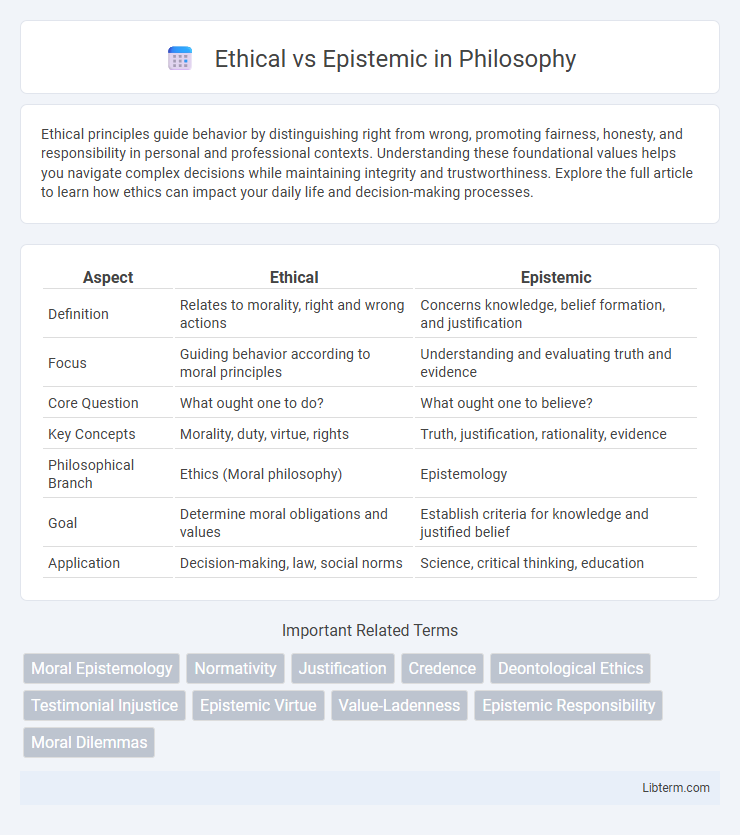Ethical principles guide behavior by distinguishing right from wrong, promoting fairness, honesty, and responsibility in personal and professional contexts. Understanding these foundational values helps you navigate complex decisions while maintaining integrity and trustworthiness. Explore the full article to learn how ethics can impact your daily life and decision-making processes.
Table of Comparison
| Aspect | Ethical | Epistemic |
|---|---|---|
| Definition | Relates to morality, right and wrong actions | Concerns knowledge, belief formation, and justification |
| Focus | Guiding behavior according to moral principles | Understanding and evaluating truth and evidence |
| Core Question | What ought one to do? | What ought one to believe? |
| Key Concepts | Morality, duty, virtue, rights | Truth, justification, rationality, evidence |
| Philosophical Branch | Ethics (Moral philosophy) | Epistemology |
| Goal | Determine moral obligations and values | Establish criteria for knowledge and justified belief |
| Application | Decision-making, law, social norms | Science, critical thinking, education |
Understanding the Concepts: Ethical vs Epistemic
Ethical concepts revolve around principles of right and wrong, guiding moral judgments and behavior in various contexts, while epistemic concepts concern the nature and justification of knowledge, focusing on truth, belief, and evidence. Understanding the distinction between ethical and epistemic frameworks clarifies how individuals assess moral responsibilities versus the validity and reliability of information. This differentiation is crucial for analyzing debates where moral values intersect with claims about knowledge or truth.
Defining Ethical Principles and Epistemic Values
Ethical principles guide moral decision-making by emphasizing values such as fairness, justice, and respect for individuals, ensuring actions align with societal norms and human well-being. Epistemic values prioritize knowledge acquisition through accuracy, coherence, and intellectual honesty, driving the pursuit of truth and reliable understanding. Distinguishing these frameworks clarifies how moral obligations differ fundamentally from the goals of knowledge validation and inquiry.
Historical Perspectives: Ethics and Epistemology
Historical perspectives reveal that ethics, rooted in moral philosophy, focuses on principles of right and wrong to guide human behavior, while epistemology addresses the nature and scope of knowledge. Classical philosophers such as Aristotle and Kant extensively explored ethical frameworks, whereas figures like Descartes and Locke laid foundational quests in epistemology. Over time, the distinct yet interconnected development of ethics and epistemology has shaped contemporary debates on moral reasoning and knowledge validation.
Core Differences Between Ethical and Epistemic Considerations
Ethical considerations focus on principles of right and wrong, guiding moral judgments and actions, while epistemic considerations prioritize knowledge, truth, and justification in belief formation. Core differences include the normative goals, where ethical concerns seek to promote fairness and well-being, and epistemic concerns aim for accuracy and coherence in understanding. The evaluation criteria diverge as ethical assessments rely on values and duties, whereas epistemic assessments emphasize evidence and logical reasoning.
Intersections of Ethics and Epistemology
Ethical and epistemic domains intersect in evaluating the responsibility of knowledge acquisition and dissemination, emphasizing honesty, integrity, and the avoidance of misinformation. Epistemic virtues such as intellectual humility and rigor are crucial for ethical decision-making, ensuring that beliefs and actions are justified and morally sound. The synergy between ethics and epistemology fosters a framework where truth-seeking aligns with moral accountability in both individual and collective contexts.
Case Studies: Ethical Dilemmas vs Epistemic Problems
Ethical dilemmas in case studies highlight conflicts between moral principles, such as patient confidentiality versus the duty to warn, requiring value-based decision-making. Epistemic problems involve challenges related to knowledge acquisition, justification, and belief formation, often exploring uncertainty in data interpretation or bias in evidence evaluation. Analyzing ethical dilemmas requires normative reasoning about right actions, while addressing epistemic problems focuses on improving methods of inquiry and validation.
The Role of Truth in Ethical and Epistemic Reasoning
The role of truth in ethical reasoning centers on moral principles and values that guide behavior toward what is right or just, emphasizing authenticity and integrity in decision-making. In epistemic reasoning, truth functions as a fundamental goal, aiming to acquire accurate knowledge and justified beliefs through evidence and logical coherence. Both ethical and epistemic frameworks rely on truth, but while epistemic truth seeks objective accuracy, ethical truth involves aligning actions with moral correctness.
Practical Implications in Decision-Making
Ethical considerations in decision-making prioritize moral values and principles to ensure choices align with fairness, rights, and social responsibilities, often guiding the acceptability of outcomes. Epistemic factors focus on the accuracy, justification, and reliability of knowledge that informs decisions, emphasizing evidence quality and belief formation. Practical implications reveal that integrating ethical and epistemic perspectives leads to more responsible, informed decisions that balance moral integrity with cognitive rigor.
Challenges at the Ethical-Epistemic Boundary
Challenges at the ethical-epistemic boundary arise from the tension between the pursuit of knowledge and the moral responsibilities involved in research practices. Ethical dilemmas often emerge when epistemic goals, such as data accuracy or experimental rigor, conflict with respect for participant rights, consent, and welfare. Navigating this boundary requires careful consideration of both epistemic virtues like transparency and reliability, and ethical principles including beneficence and justice.
Future Directions: Integrating Ethical and Epistemic Insights
Future directions emphasize integrating ethical and epistemic insights to enhance decision-making frameworks in artificial intelligence and knowledge systems. This integration fosters responsible innovation by aligning truth-oriented epistemic goals with value-driven ethical considerations. Advancements in interdisciplinary methodologies and transparent algorithms will support systems capable of balancing accuracy, fairness, and societal impact.
Ethical Infographic

 libterm.com
libterm.com